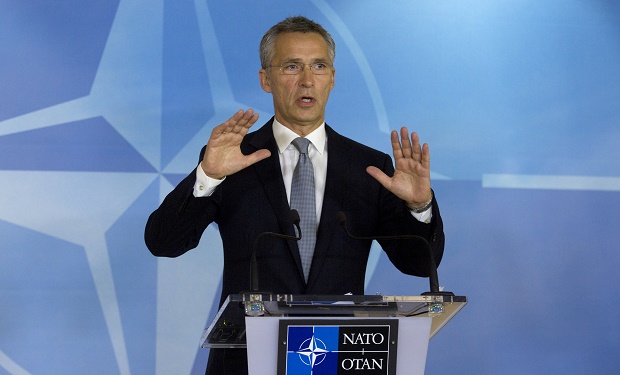
NATO Secretary General Jens Stoltenberg speaks during a media conference at NATO headquarters in Brussels on Thursday, Oct. 8, 2015. NATO defense ministers meet Thursday to consider the implications of recent Russian military actions in Syria, as well as ongoing measures to retool NATO to meet contemporary security threats. AP
BRUSSELS — North Atlantic Treaty Organization (NATO) secretary-general Jens Stoltenberg said alliance defense ministers on Thursday will consider the implications for NATO’s own security of the “troubling escalation of Russian military activities” in Syria.
He said NATO is ready to deploy forces, if needed, to defend alliance member Turkey.
On Wednesday, Russian warships fired cruise missiles in the first combined air-and-ground assault with Syrian government troops since Moscow began its military campaign in the country last week.
Over the weekend, Turkey reported back-to-back violations of its airspace by Russian warplanes.
US Defense Secretary Ash Carter and his counterparts from the 27 other NATO nations had already been scheduled to meet Thursday in Brussels.
Stoltenberg told reporters the meeting will receive an update from its military commanders on the situation in Syria, as well as Afghanistan.
“In Syria, we have seen a troubling escalation of Russian military activities,” Stoltenberg said. “We will assess the latest developments and their implications for the security of the alliance. This is particularly relevant in view of the recent violations of NATO’s airspace by Russian aircraft.”
NATO on Monday issued a statement demanding that the violations cease. Russia called its penetration of Turkish airspace a minor incident that was unintentional. Stoltenberg had already brushed off the Russian explanation.
“NATO is able and ready to defend all allies, including Turkey, against any threat,” the secretary-general said Thursday. He said NATO had already increased “our capacity, our ability, our preparedness to deploy forces, including to the south, including in Turkey, if needed.”
“We are constantly assessing the situation also with the Turkish government,” Stoltenberg said, adding that he would be meeting later Thursday with Turkish Defense Minister Mehmet Vecdi Gonul.
The defense ministers’ meeting, their first since June, is also expected to approve ongoing efforts to retool NATO to meet a daunting array of contemporary security threats. Decisions expected include approval for two new NATO headquarters units in Hungary and Slovakia to enhance their defenses and speed the deployment of reinforcements sent by other alliance nations, and changes in the beefed-up NATO Response Force to, in Stoltenberg’s words, make it “bigger, faster and more capable.”
“We are facing many challenges from many different directions,” Stoltenberg said. “Conflict, instability and insecurity.”
“We will assess what we have to do to adapt NATO to current and future challenges,” he said including cyberattacks and the mix of conventional and unconventional tactics commonly known as hybrid warfare.
RELATED STORIES
NATO denounces Russia for violating Turkish airspace
NATO says Russia deliberately violating Turkey air space